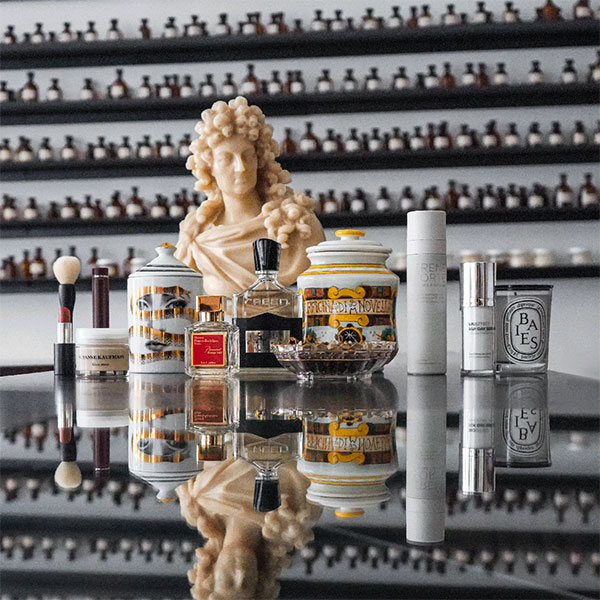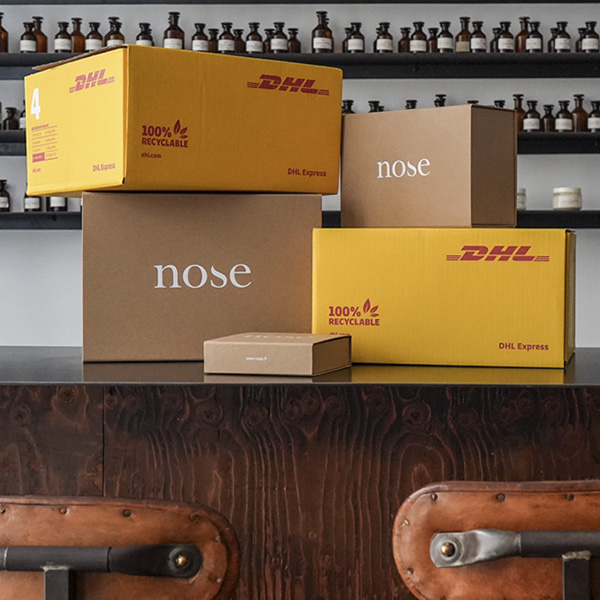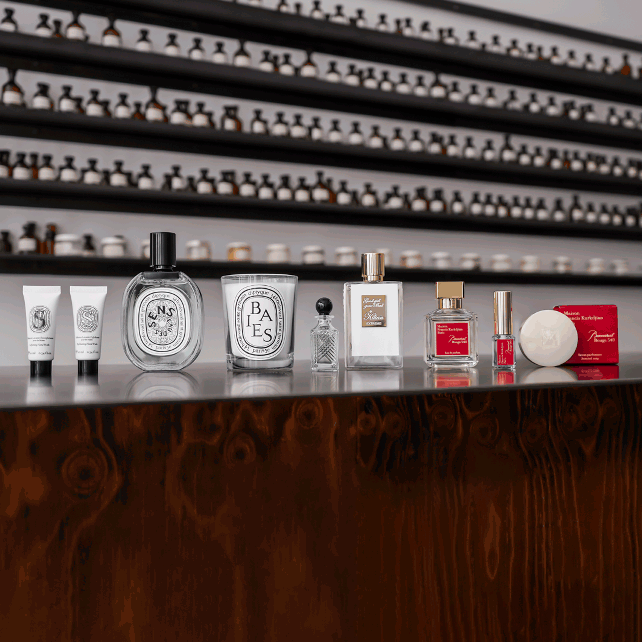
100% authentic products & official reseller for :
creed, maison francis kurkdjian, kilian paris, marc antoine barrois
You have a question? Please consult the Frequent Asqued Questions (FAQ).
If you don't find your answer, please contact us:
by email: info@noseparis.com
by phone: +33 1 86 47 72 76
To know more about returns and refunds, please consult Terms and Conditions of Sales, section 6 Right to and period of withdrawal.
Nose ship perfume by international airfreight and by La Poste for the services Colissimo Expert and Chronopost Classic to more than 75 countries.
To know more, please consult the Frequent Asked Questions (FAQ)
Nose proposes an olfactive diagnosis where 5 perfumes will be proposed among a list of 500 curated ones.
Do the diagnosisNose proposes an olfactive diagnosis where 5 perfumes will be proposed among a list of 500 curated ones.
Do the diagnosisEmilie Coppermann keeps her approach to perfumery on the lighter side, turning the profession into her own game - a game she has played since she was thirteen years old. Today, she creates perfumes for The Different Company, Comme des Garçons, by constantly reinterpreting an ever-changing dream. Here’s a meeting with the free-spirited and inspired creative...
What is your motto?
To always approach perfumery with lightness. The way this industry works makes you lose many more projects than those that you win. You need to have a philosophical attitude towards deceptions, and the ability to be enthusiastic about the projects that you do win.
You were very young when you decided to work with perfumes. What motivated you?
I was motivated by a special encounter. I had the opportunity to talk to Nicolas Mamounias when I was 13 years old. At the time, he was working at Rochas. Before that, I’d never imagined that at profession could match what my passion to such an extent. The desire to become a perfumer never left me after that.
You say that you appreciate the emotional and relational aspects of your profession - what do you mean by that?
When you talk to anybody about perfumes, there is always something extremely personal about it. Everyone wants to share a feeling, an experience or an emotion that they’ve felt with a certain perfume. People have stronger experiences with perfumes than with any other art. Try talking to people about paintings, sculptures or music, and they’ll be interested, but if you talk about perfumes the conversation is directed towards a much more personal domain, which is also more emotional. That is the atmosphere that touches and inspires me.
What is your approach to the different brands (such as TDC, Comme de garçons) while you’re in the process of creating perfumes for them?
I have an approach that is really simple and free. Everything is permitted - we’ll see later on if I went too far. My relationship with the brands is built on confidence and harmony. They inspire me, and I know that they have very knowledgeable customers. There’s a dialogue that naturally comes in to place which helps carrying me through the process.
Do you have any habits or special ways of working that characterize your creations? How can we recognize your work?
I see perfumery as a game. I like to start with an offbeat idea, a surprising story, to take an unexpected turn. Then I continue my work as a part of a team - with other perfumers, with the people who evaluate the process, with the brands. There is no such thing as a bad idea - in that case it’s up to me to reinterpret it. I wouldn’t know if I have a special mark that you can recognize me by. I love working with wood, but I’m also a fan of iris, leather, Cologne and jasmine. Ultimately, my creations are all very different and I’m not sure whether you’ll find a specific olfactive link between them.
Where do you find the inspiration for new creations?
Everything can be a source of inspiration. First of all, I have an inexhaustible supply of olfactive memories - ranging from the rose lassi I was given in India, via the frangipani fields plunging into the ocean in Columbia, to the incense burning on the Kudéta beach in Bali. I also get very inspired by the raw materials I use, as well as through the exchange with the teams who know my work, who have a real expertise on the brand that I’m working for. I’m also very much in touch with the time I live in - I pay attention to trends and I’m very curious about new artistic waves that resonate with what I love to do.
How has your way of dealing with your profession changed since you first started?
I started over 20 years ago. The perfume industry has changed enormously; I’d almost say that nothing is the same anymore. First, the number of product launches has multiplied - the launches are now all global - and the perfumes are subject to consumer testing, which is very constraining. The emergence of niche perfumeries seems to be the consumers’ response to the abundance of products on the market. People are looking for fragrances with real identities, they demand raw materials of higher quality, and they want a more personalized distribution that is capable of transforming the act of buying perfume into a luxurious experience. Perfumers also team up more frequently, joining forces globally within companies. With all the new technology it has become easy to be in Paris and at the same time participate on projects in New York, San Paulo or Shanghai.
Who do you dream of creating a perfume for? What would be the perfume of your dreams?
I’ve already thought about what a perfume for Daniel Day Lewis would be like. He embodies all of his roles with so much intensity, like he’s wearing a second skin. Would he like to have a different scent for each role? Or maybe the contrary - to live with an only perfume as a form of reassurance? In either case, the fragrance would be multifaceted and sublimely sexy... If, by any chance you’d happen to have his number...!
In much the same spirit - I’d love to create a chameleonic perfume, one that envelops and accompanies the person who carries it, while also adapting to each individual person. This phenomenon already exists naturally to a certain extent, but I would like to go even further. I’d also like to make a perfume that really stirs your imagination - even though, I guess they all stir your imagination...

100% authentic products & official reseller for :
creed, maison francis kurkdjian, kilian paris, marc antoine barrois

no custom, nor clearance and VAT-free under $800
free express DHL delivery from Paris to New York, Los Angeles, Chicago, or Miami
within 2-3 working days for any order above €167 (before VAT) / $175
(all information here)

French (euros) prices (likely among the most competitive)
3 free samples with orders from 80€ and 6 from 160€
+500 gifts available with purchases across 80% of our brands